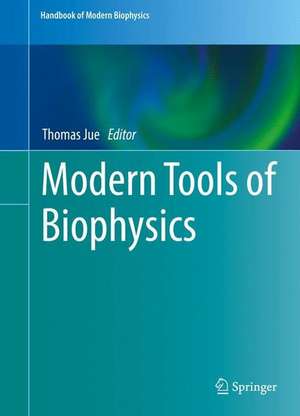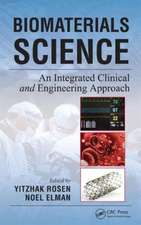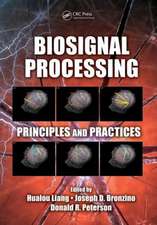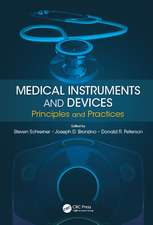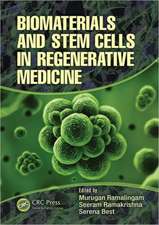Modern Tools of Biophysics: Handbook of Modern Biophysics, cartea 5
Editat de Thomas Jueen Limba Engleză Hardback – 9 mai 2017
Volume 5: Modern Tools of Biophysics
Editor: Thomas Jue, PhD
In Modern Tools of Biophysics, a group of prominent professors have provided insights into the tools used in biophysics with respect to the following topics:
- Wave Theory of Image Formation in a Microscope: Basic Theory and Experiments
- Computer Simulations and Nonlinear Dynamics of Cardiac Action Potentials
- Myoglobin and Hemoglobin Contribution to the NIRS Signal in Muscle
- Anomalous Low Angle X-Ray Scattering of Membrane with Lanthanides
- Recording of Ionic Currents under Physiological Conditions—Action Potential-Clamping and “Onion-Peeling” Techniques
- Patch Clamp Technique and Applications
About the Editor
Thomas Jue is a Professor in the Department of Biochemistry and Molecular Medicine at the University of California, Davis. He is an internationally recognized expert in developing and applying magnetic resonance techniques to study animal as well as human physiology in vivo and has published extensively in the field of magnetic resonance spectroscopy and imaging, near-infrared spectroscopy, bioenergetics, cardiovascular regulation, exercise, and marine biology. He served as a Chair of the Biophysics Graduate Group Program at UC Davis, where he started to develop scholarly approaches to educate graduate students with a balance of physical-science/mathematics formalism and biomedical perspective in order to promote interest at the interface of physical science, engineering, mathematics, biology, and medicine. He continues to develop the biophysics curriculum, and the Handbook of Modern Biophysics represents an aspect of that effort.
| Toate formatele și edițiile | Preț | Express |
|---|---|---|
| Paperback (1) | 775.15 lei 43-57 zile | |
| Springer – 19 iul 2018 | 775.15 lei 43-57 zile | |
| Hardback (1) | 782.42 lei 43-57 zile | |
| Springer – 9 mai 2017 | 782.42 lei 43-57 zile |
Preț: 782.42 lei
Preț vechi: 954.17 lei
-18% Nou
Puncte Express: 1174
Preț estimativ în valută:
149.76€ • 162.73$ • 125.88£
149.76€ • 162.73$ • 125.88£
Carte tipărită la comandă
Livrare economică 21 aprilie-05 mai
Preluare comenzi: 021 569.72.76
Specificații
ISBN-13: 9781493967117
ISBN-10: 1493967118
Pagini: 122
Ilustrații: X, 122 p. 51 illus., 26 illus. in color.
Dimensiuni: 178 x 254 x 10 mm
Greutate: 0.45 kg
Ediția:1st ed. 2017
Editura: Springer
Colecția Springer
Seria Handbook of Modern Biophysics
Locul publicării:New York, NY, United States
ISBN-10: 1493967118
Pagini: 122
Ilustrații: X, 122 p. 51 illus., 26 illus. in color.
Dimensiuni: 178 x 254 x 10 mm
Greutate: 0.45 kg
Ediția:1st ed. 2017
Editura: Springer
Colecția Springer
Seria Handbook of Modern Biophysics
Locul publicării:New York, NY, United States
Cuprins
Wave Theory of Image Formation in a Microscope.- Recording of ionic currents under physiological conditions: Action Potential-Clamp and "Onion-Peeling" techniques.- Patch Clamp Technique and Applications.- Structural Insights from Membrane Small Angle X-ray Diffraction with Anomalous X-ray Scattering.- Computer simulations and nonlinear dynamics of cardiac action potentials.- Hemoglobin and myoglobin contribution to the NIRS signal in skeletal muscle.
Notă biografică
Thomas Jue is a Professor in the Department of Biochemistry and Molecular Medicine at the University of California, Davis. He is an internationally recognized expert in developing and applying magnetic resonance techniques to study animal as well as human physiology in vivo and has published extensively in the field of magnetic resonance spectroscopy and imaging, near-infrared spectroscopy, bioenergetics, cardiovascular regulation, exercise, and marine biology. He served as a Chair of the Biophysics Graduate Group Program at UC Davis, where he started to develop scholarly approaches to educate graduate students with a balance of physical-science/mathematics formalism and biomedical perspective in order to promote interest at the interface of physical science, engineering, mathematics, biology, and medicine. He continues to develop the biophysics curriculum, and the Handbook of Modern Biophysics represents an aspect of that effort.
Textul de pe ultima copertă
Handbook of Modern Biophysics brings current biophysics topics into focus, so that biology, medical, engineering, mathematics, and physical-science students or researchers can learn fun¬damental concepts and the application of new techniques in addressing biomedical challenges. Chapters will develop the conceptual framework of the physics formalism and illustrate the biomedical applica¬tions. With the addition of problem sets, guides to further study, and references, the interested reader can continue to independently explore the ideas presented.
Thomas Jue is a Professor in the Department of Biochemistry and Molecular Medicine at the University of California, Davis. He is an internationally recognized expert in developing and applying magnetic resonance techniques to study animal as well as human physiology in vivo and has published extensively in the field of magnetic resonance spectroscopy and imaging, near-infrared spectroscopy, bioenergetics, cardiovascular regulation, exercise, and marine biology. He served as a Chair of the Biophysics Graduate Group Program at UC Davis, where he started to develop scholarly approaches to educate graduate students with a balance of physical-science/mathematics formalism and biomedical perspective in order to promote interest at the interface of physical science, engineering, mathematics, biology, and medicine. He continues to develop the biophysics curriculum, and the Handbook of Modern Biophysics represents an aspect of that effort.
Volume 5: Modern Tools of Biophysics
Editor: Thomas Jue, PhD
In Modern Tools of Biophysics, a group of prominent professors have provided insights into the tools used in biophysics with respect to the following topics:- Wave Theory of Image Formation in a Microscope: Basic Theory and Experiments
- Computer Simulations and Nonlinear Dynamics of Cardiac ActionPotentials
- Myoglobin and Hemoglobin Contribution to the NIRS Signal in Muscle
- Anomalous Low Angle X-Ray Scattering of Membrane with Lanthanides
- Recording of Ionic Currents under Physiological Conditions—Action Potential-Clamping and “Onion-Peeling” Techniques
- Patch Clamp Technique and Applications
About the Editor
Caracteristici
Written by leaders in the biophysics field All topics are covered by concept and then biological application Each chapter will contain didactic elements that facilitate teaching, self-study, and research preparation Includes supplementary material: sn.pub/extras
